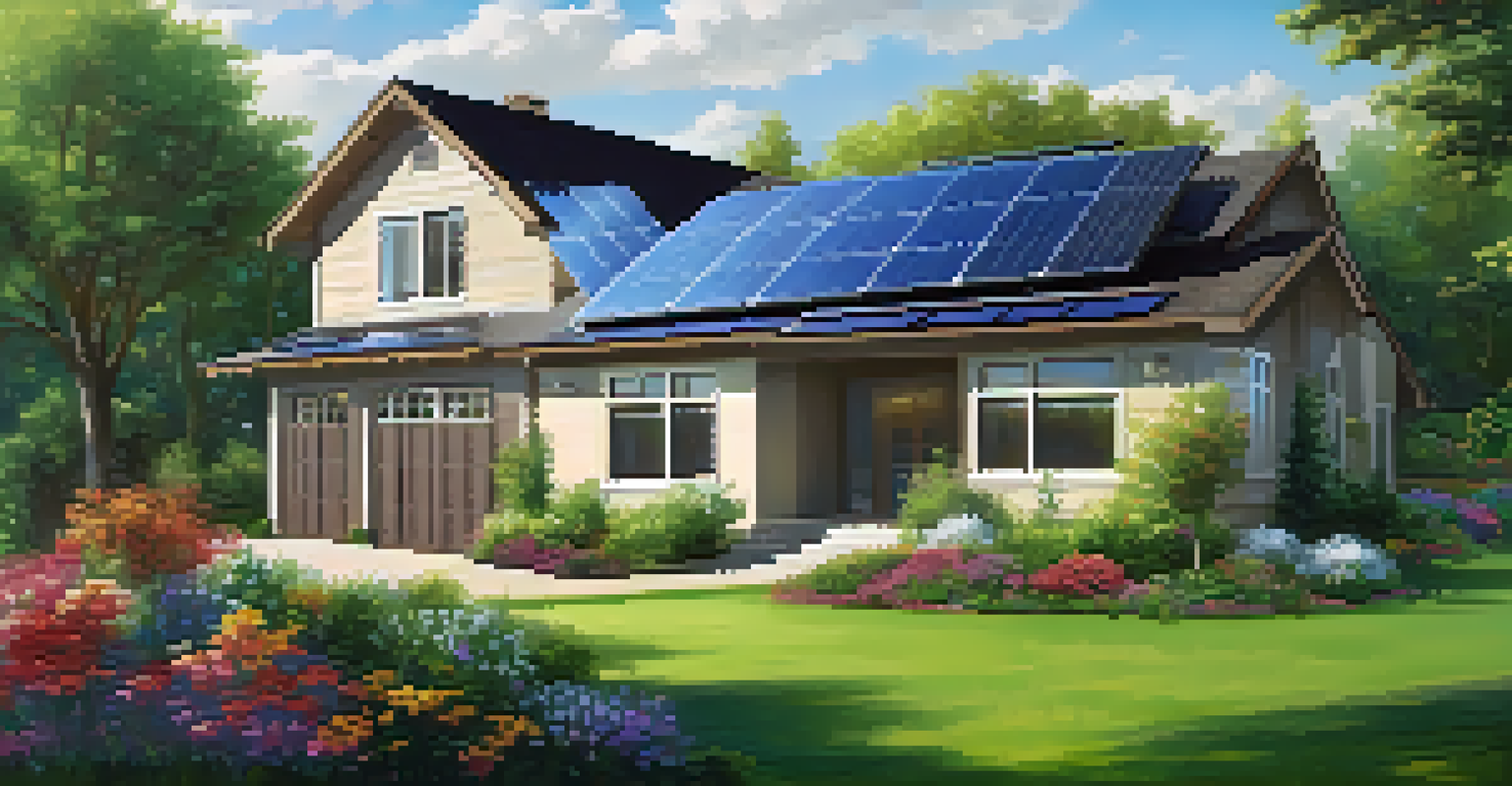Understanding the Role of Energy Efficiency in Home Value

What is Energy Efficiency in Homes?
Energy efficiency in homes refers to using less energy to provide the same service. This includes everything from insulation that keeps your house warm in winter to energy-efficient appliances that use less electricity. By optimizing how energy is used, homeowners can lower utility bills while reducing their environmental impact.
Energy efficiency is the first step in addressing climate change. It allows us to reduce our energy consumption while still meeting our needs.
In simple terms, think of energy efficiency as getting more 'bang for your buck' when it comes to energy consumption. Just like a fuel-efficient car that saves you money on gas, an energy-efficient home can significantly cut down on monthly expenses. This aspect not only benefits the homeowner but also appeals to potential buyers looking for cost-saving features.
With rising energy costs, energy efficiency has become a hot topic. Homeowners are increasingly prioritizing upgrades that enhance efficiency, making it a crucial factor in the housing market. Understanding this concept is the first step toward recognizing its influence on home value.
Why Buyers Value Energy-Efficient Homes
When it comes to buying a home, energy efficiency is often at the top of buyers' wish lists. Many people today are environmentally conscious and prefer homes that are responsible in terms of energy use. This means that homes with energy-efficient features are often seen as more desirable.

Additionally, energy-efficient homes can lead to substantial savings over time. For instance, a home equipped with energy-efficient appliances and high-quality insulation can lower utility bills significantly. Buyers are savvy; they know that investing in a home with these features can save them money in the long run.
Energy Efficiency Saves Money
Upgrading to energy-efficient appliances and insulation can significantly reduce utility bills for homeowners.
Furthermore, energy-efficient homes often come with higher resale values. As the market shifts toward sustainability, homes that feature energy-efficient upgrades are likely to appreciate more than their less-efficient counterparts. This trend makes energy efficiency not just a buyer preference but a smart investment.
How Energy Efficiency Affects Home Appraisals
Home appraisals are critical when buying or selling a property, and energy efficiency can play a vital role in this process. Appraisers often consider the energy-efficient features of a home when determining its value. This means that homes with solar panels, energy-efficient windows, or high-efficiency HVAC systems may receive a higher appraisal.
The best way to predict the future is to create it.
For example, a home with Energy Star-rated appliances can stand out during an appraisal. These appliances not only reduce energy consumption but also signal to appraisers that the home has been maintained with efficiency in mind. This can lead to a favorable valuation compared to similar homes without these features.
Moreover, as the demand for energy-efficient homes rises, appraisers are increasingly incorporating energy efficiency into their evaluation criteria. This shift in focus can significantly impact a homeowner's equity and overall financial strategy, making energy efficiency an essential consideration for all homeowners.
Key Energy Efficiency Upgrades for Homeowners
If you’re looking to boost your home's energy efficiency, several upgrades can make a significant difference. Simple fixes like sealing gaps around doors and windows can prevent drafts, while adding insulation can keep your home comfortable year-round. These small changes can lead to noticeable reductions in energy costs.
Investing in energy-efficient appliances is another smart move. Look for appliances with the Energy Star label, which indicates they meet energy efficiency guidelines set by the U.S. Environmental Protection Agency. Replacing old, inefficient appliances can not only lower energy bills but also enhance the overall appeal of your home.
Value of Energy-Efficient Homes
Homes with energy-efficient features are increasingly desirable, leading to higher resale values and greater market appeal.
Additionally, consider installing a smart thermostat. This innovative device allows you to manage your home's heating and cooling more effectively, adapting to your schedule and significantly reducing energy waste. These upgrades not only enhance comfort but also pay off in increased home value.
The Role of Energy Audits in Enhancing Efficiency
An energy audit is a comprehensive evaluation of your home’s energy use. This process identifies areas where energy is being wasted and suggests improvements. Hiring a professional to conduct an audit can provide valuable insights into how to enhance your home's efficiency and, in turn, its value.
During an energy audit, experts typically assess insulation levels, heating and cooling systems, and the overall energy consumption of your home. They may use specialized tools to pinpoint leaks and inefficiencies that you might not notice. This thorough examination can help you prioritize which upgrades will yield the most significant benefits.
By implementing the recommendations from an energy audit, you can increase your home's energy efficiency, making it more appealing to potential buyers. Not only will you enjoy lower utility bills, but you'll also position your home as a competitive option in the market.
Energy Efficiency and Environmental Responsibility
Investing in energy efficiency is not just about saving money; it's also about being environmentally responsible. By reducing energy consumption, homeowners can contribute to a decrease in greenhouse gas emissions, which is crucial in the fight against climate change. This connection between energy efficiency and sustainability is becoming increasingly important to many buyers.
Think of your home as an extension of your values—if you care about the planet, making energy-efficient choices reflects that commitment. From using renewable energy sources to optimizing energy use, each step taken can lead to a more sustainable lifestyle. This focus on eco-friendliness resonates with many buyers and can enhance your home's marketability.
Sustainability Drives Buyer Interest
As environmental concerns grow, energy-efficient homes attract buyers who prioritize eco-friendly living, enhancing property value.
As the world becomes more focused on sustainability, homes that showcase energy-efficient features are likely to attract like-minded buyers. This growing awareness of environmental impact can drive demand for your property, ultimately boosting its value.
The Future of Energy Efficiency in Real Estate
The future of real estate is increasingly intertwined with energy efficiency. As technology advances, new solutions for improving energy performance in homes are emerging. Innovations like smart home systems, advanced insulation materials, and energy-generating technologies are setting new standards for what buyers expect.
Moreover, governments and organizations are promoting energy efficiency through incentives and regulations. Homeowners are encouraged to adopt energy-efficient practices through tax credits, rebates, and grants. These initiatives not only make efficiency upgrades more affordable but also highlight their importance in the housing market.

As a result, energy efficiency is likely to become a non-negotiable feature for future homebuyers. Sellers who prioritize these upgrades will stand out in a competitive market, ensuring their homes remain valuable investments. Embracing energy efficiency today will pave the way for a brighter, more sustainable tomorrow in real estate.